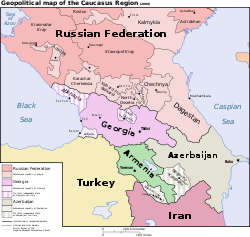The conflict between Iran’s National Intelligence and Security Organization (SAVAK) and Israel’s Institute for Intelligence and Special Operations (Mossad) has become more visible since the beginning of 2012.
Iranian scientist Mostafa Ahmadi Rosha was assassinated in Tehran in January 2012. Following this incident, many stories appeared in the media regarding Mossad and Iran’s search for retaliation. However, the interesting part of this story is that the parties have chosen the South Caucasus for this competition. According to Azerbaijani reports, two people linked to Iranian intelligence were arrested in January. The story became more complicated following the statements of officials that these two suspicious people were planning to attack the Israeli embassy in Azerbaijan and a Jewish rabbi. In response to this event, Iranian National Security and Foreign Policy Committee member Esmail Kowsari blamed Baku and claimed that Baku is a known safe haven for the CIA and Mossad. At the same time, Kowsari emphasized that they are uncomfortable with the activities of Israeli and American spies along Azerbaijan’s border with Iran.

Caucasus Region
In reality, bilateral relations between Israel and Azerbaijan have been developing for a long time. Apart from the mutual customs agreement signed in December 2011, the trade volume between the two countries recently totaled approximately $2 billion. Moreover, Israel and Azerbaijan signed a bilateral agreement related to the military sector. According to this agreement, worth $1.6 billion, Azerbaijan will receive drones and air defense systems from Israel. It is thought that Azerbaijan is trying to gain an advantage in the Karabakh conflict against Armenia by increasing its military capability. It is worth noting that, from many other countries, it chose to cooperate with Israel. Considering this choice, it is unknown how correct Iran’s accusation is. Azerbaijani efforts to develop good relations with Israel can be considered a quite logical reply to Iranian initiatives to promote bilateral relations with Armenia in the Caucasus. However, considering Rosha’s assassination in January, we can say that instead of following indirect balancing policies, Baku is now trying to send direct messages to Tehran.
Baku won’t host power struggles
In the wake of the spy issue, Baku initially sent signals indicating they do not want their land becoming an area for power struggles. Furthermore, Baku is indicating its discomfort with Tehran’s activities in the Caucasus. However, it should be noted that it is not the first time Baku has sent messages to Tehran in order to communicate its discomfort. According to Azerbaijani experts, Baku first showed changes in its position in November 2011, when it did not vote on the issue of Iranian human rights abuses. Experts state that although Azerbaijan has chosen not to participate in negative UN resolutions regarding its southern neighbor up to now, Baku is giving signals that it may change its position as a non-permanent member of the UN Security Council if Tehran does not change its behavior.Recently, it seems that Iran is not only blaming Azerbaijan for working in coordination with foreign intelligence agencies but is also seeking sanctions against Baku. Furthermore, recently Iran has been preparing to deport an Azerbaijani diplomat because of accusations that he supports the gay rights demonstrations planned for the upcoming Eurovision Song Contest in Baku.
While the countries’ politicians try to manage the tension between Azerbaijan and Iran in a controlled manner, there is another country — Georgia — that is also trying stay out of any sort of quarrel between Israel and Iran. Israeli authorities leveled charges against Iran after they found a magnet bomb hidden in a car belonging to an Israeli diplomat in Tbilisi and, on the same day, prevented an assassination attempt on an Israeli diplomat in New Delhi. It is interesting that the methods used to assassinate Iranian engineers and Israeli diplomats are quite similar.
Georgia is wary of getting in the middle of the relations between Iran, Israel and the West. They experienced the difficulties of being caught between the West and Russia before and are still suffering from those difficulties. Nevertheless, after the Russo-Georgian War in 2008, Tbilisi has been trying to establish friendly relations with Iran by lifting visa requirements and enhancing cultural and economic relations. All of these efforts cause discomfort in Washington. Lincoln Mitchell from Columbia University indicates that the recent bilateral relations will not be long-lived. Moreover, he stated that considering the parliamentary elections this year and the presidential elections to be held in 2013, Georgia may have to reconsider its relations with Iran.
Looking at the big picture, Iran is blamed for organizing assassinations against diplomats in various countries. These accusations hurt the Iranian image, and worries over the Caucasus are getting stronger. Following the rising tension in the Middle East due to the Arab Spring and the recent developments in the Caucasus, which generated a new balance after the Russo-Georgian War, some questions come to mind. Will these developments create a new system that divides countries into certain blocs? Or, are some trying to spread instability to this wide-ranging area? Regardless, one reality is that while Turkey has been basing its foreign policy on maintaining regional stability, undesirable regional tensions are dramatically arising just beyond its borders.
No comments:
Post a Comment